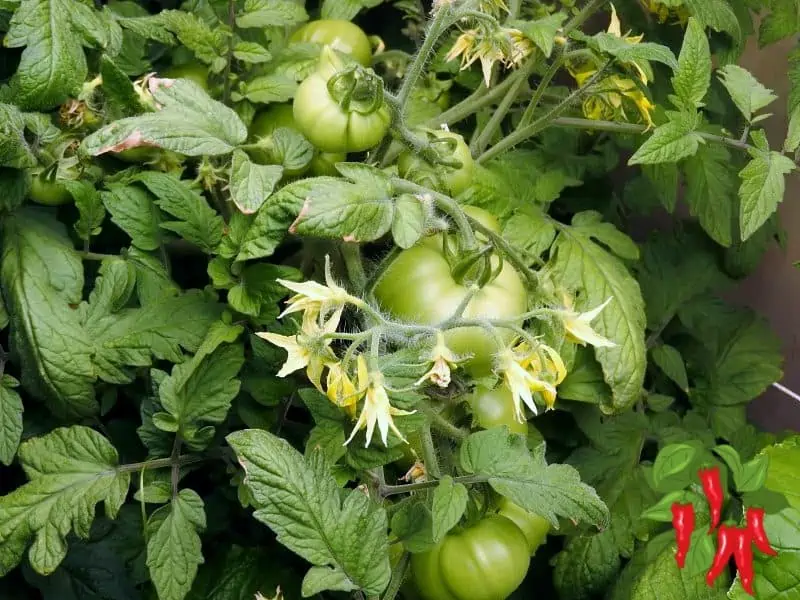This post may contain affiliate links. If you buy something from one of our links we may earn a commission. Thanks
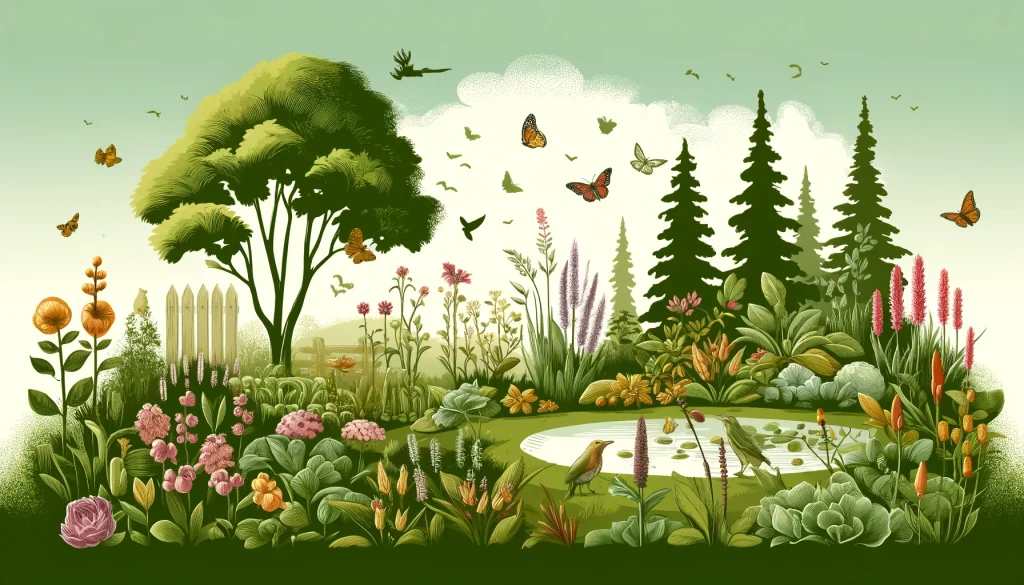
Imagine turning your garden into a powerhouse for the planet. Yes, the environmental benefits of gardening stretch far beyond just beautifying your backyard.
From slashing carbon footprints to fostering biodiversity, discover how your green thumb can make a real difference!
Key Takeaways:
- The environmental benefits of gardening include reducing carbon emissions, conserving water, improving air quality, and supporting biodiversity.
- Gardens help sequester carbon, decrease reliance on pesticides, and offer habitats for wildlife, making them valuable for ecological health and sustainability.
The Environmental Benefits of Gardening
Gardening stretches far beyond a mere pastime—it’s an eco-friendly powerhouse. This post will explore the multifaceted environmental benefits of gardening, shedding light on how your green space can contribute significantly to planetary health.
What Is Gardening? Why Garden at Home?
Gardening is the process of growing plants for their vegetables, fruits, flowers, herbs, and appearances within a designated space. Gardens fulfill a wide assortment of purposes, notably the production of aesthetically pleasing areas, medicines, cosmetics, dyes, foods, poisons, wildlife habitats, and saleable goods (see market gardening). People often partake in gardening for its therapeutic, health, educational, cultural, philosophical, environmental, and religious benefits. https://en.wikipedia.org/wiki/Gardening
Overview What We’ll Cover
We will explore how gardening practices contribute to the environment and what benefits this brings to the environment.
Each section will delve into these topics, illustrating the impactful ways gardening can serve as an environmental steward.
-
Reducing Carbon Footprints
Discover how gardening helps lower greenhouse gas emissions and what this means for our climate.
-
Water Conservation
Learn about the water-saving practices in gardening that help tackle global water scarcity.
-
Promoting Biodiversity
We’ll discuss how gardens serve as habitats for various species, supporting biodiversity.
-
Air Quality Improvement
Find out how plants in your garden can improve air quality, making the environment healthier.
-
Supporting Pollinators
Understand the critical role gardens play in providing refuge and resources for declining pollinator populations.
-
Enhancing Soil Health
Explore how gardening practices contribute to soil conservation and what benefits this brings to the environment.
1. Reduces Carbon Footprints
Gardening can significantly reduce our carbon footprints, making a positive impact on the environment. By focusing on local produce and natural processes, gardens can help decrease carbon emissions and enhance air quality.
Less Transportation Needed
Growing your own food means less need for transporting goods, which cuts down on emissions from vehicles.
Carbon Sequestration by Plants
Plants absorb CO2 from the air during photosynthesis, naturally reducing the amount of carbon dioxide in the atmosphere.
Each subtopic demonstrates how simple gardening actions can contribute to larger environmental benefits by reducing our carbon footprints.
2. Conserves Water
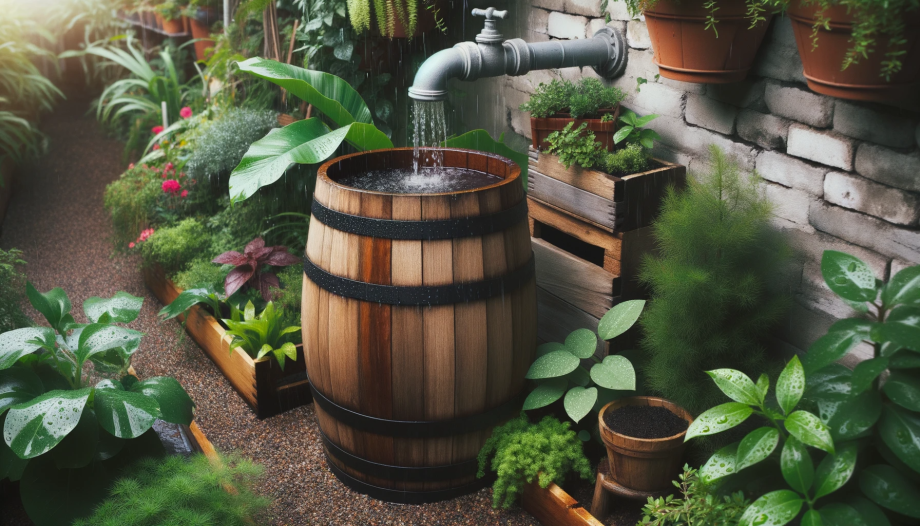
In regions facing water scarcity, gardening can still thrive by adopting water-conserving techniques. This section will guide you through methods that ensure your garden remains lush while minimizing water use.
Drip Irrigation Systems
Drip irrigation delivers water directly to plant roots, reducing waste and minimizing evaporation. It’s an efficient way to keep plants hydrated without overusing water.
Rainwater Harvesting
Collecting rainwater to use in your garden not only conserves water but also reduces reliance on municipal water systems. This practice is beneficial for your plants and the environment.
Optimal Watering Times
Watering early in the morning or late in the evening can significantly reduce water loss due to evaporation. These are the best times to water your garden to ensure the moisture is used efficiently.
These techniques highlight how strategic practices in gardening can lead to substantial water savings, helping to conserve this precious resource.
3. Supports Biodiversity

Gardens are not just for beauty; they play a crucial role in promoting biodiversity. By creating diverse plant habitats, gardens can support a wide range of species, from insects to birds.
Micro-Habitats in Gardens
Gardens act as micro-habitats, providing shelter, food, and breeding spaces for various wildlife. This diversity helps maintain ecological balance and encourages a healthy garden ecosystem.
Importance of Native Plants
Using native plants in your garden supports local wildlife more effectively than non-native species. Native plants are adapted to the local climate and soil, making them more sustainable and beneficial for indigenous insects and animals.
By fostering a variety of life forms, gardens contribute significantly to local biodiversity, enhancing both the beauty and environmental health of their surroundings.
4. Enhances Learning and Community Engagement
Gardening is more than just planting and watering—it’s a powerful educational tool that spans all ages, teaching valuable lessons in biology, ecology, and sustainability.
Educational Benefits of Gardening
Gardening offers hands-on learning opportunities in a natural setting, where both children and adults can learn about plant life cycles, the role of ecosystems, and the importance of biodiversity. It’s a practical way to experience science outside the classroom.
Community Gardens: A Social Hub
Community gardens are fantastic for fostering social interaction and building a sense of community. These gardens serve as communal spaces where people come together to grow food and flowers, share gardening tips, and take collective action towards environmental sustainability.
By engaging with gardening, individuals of all ages gain practical skills and knowledge, while community gardens strengthen neighborhood ties and promote a shared responsibility for our planet.
5. Contributes to Environmental Cleanup
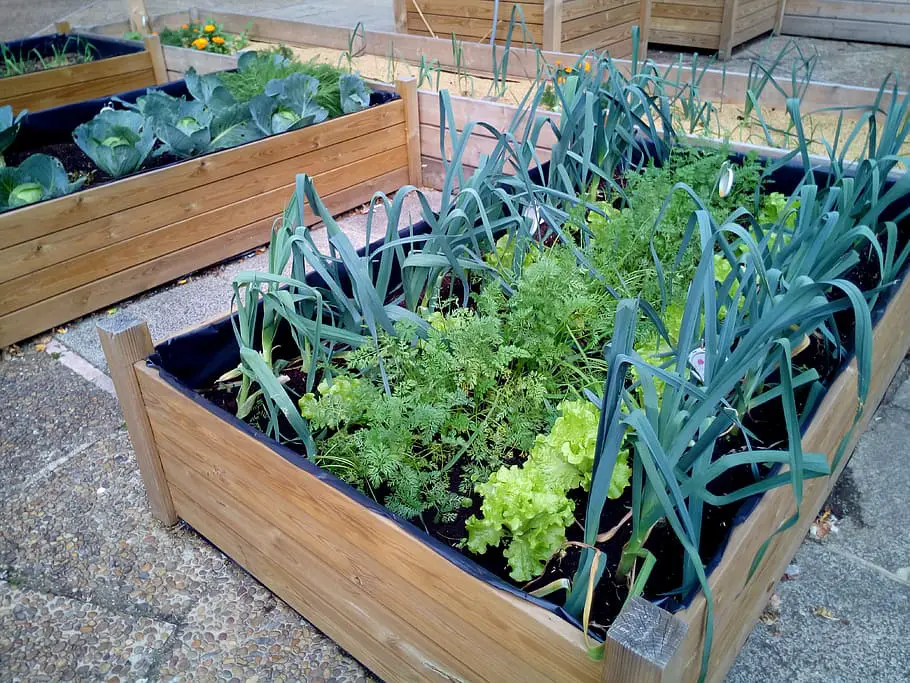
Gardens are not just pleasing to the eye; they’re also potent allies in cleaning up our environment. This section explores how gardening can aid in remediating contaminated soils and managing pollution.
Phytoremediation: Gardens as Cleansers
Phytoremediation is a process where plants are used to remove or neutralize contaminants in the soil. Certain plants, known as hyperaccumulators, can absorb heavy metals or other pollutants, gradually cleaning the soil. This natural approach is not only cost-effective but also environmentally friendly.
Plants and Soil Stability
Beyond breaking down pollutants, plants also play a crucial role in soil stabilization. Their roots help bind the soil, reducing erosion and preventing sediments and pollutants from washing away. This is especially important in areas prone to heavy rains or floods.
By integrating certain plants into gardens, we can leverage their natural abilities to cleanse and stabilize the environment, turning gardening into a powerful tool for ecological restoration.
6. Reduces Use of Pesticides and Chemicals
Embracing organic gardening practices significantly cuts down on the use of harmful chemicals, benefiting both our health and the environment.
Organic Gardening Practices
Organic gardening emphasizes natural growth processes without the use of synthetic pesticides or fertilizers. This method encourages gardeners to use organic compounds, companion planting, and natural pest predators to manage garden health. These practices reduce the chemical runoff that can lead to water and soil pollution, promoting a safer environment.
Healthier Ecosystems
By avoiding synthetic chemicals, organic gardens support more vibrant ecosystems. The absence of harsh chemicals allows beneficial insects and microorganisms to thrive, which are crucial for pollination and soil health. This biodiversity is not only essential for the garden itself but also supports broader ecological balance.
Organic gardening thus represents a proactive step towards sustainable living, contributing to a healthier planet by reducing the environmental impact of traditional gardening practices.
7. Prevents Soil Erosion
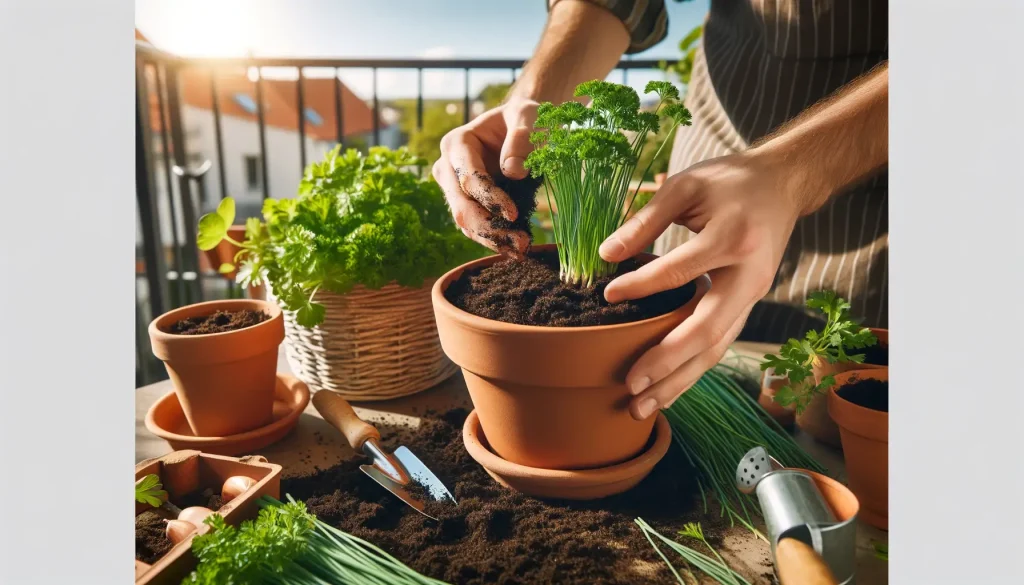
Gardening plays a crucial role in combating soil erosion, a significant environmental issue that affects land fertility and water quality.
Stabilizing Soil with Root Systems
The roots of plants act like a net, holding soil in place and preventing it from being washed or blown away. This root network not only secures the topsoil, which is rich in nutrients and essential for plant growth, but also maintains the structure of the soil, reducing the risk of erosion.
Techniques to Maintain Soil Integrity
- Cover Cropping: Planting cover crops like clover or ryegrass in the off-season helps cover the soil, thereby preventing erosion. These plants protect the soil from the impact of raindrops, wind, and runoff.
- Proper Plant Spacing: Allowing adequate space between plants ensures that each plant’s root system has enough room to spread out and effectively hold the soil. This technique not only helps in reducing erosion but also promotes healthier plant growth by reducing competition for resources.
By implementing these techniques, gardeners can greatly diminish the effects of soil erosion, enhancing both the stability of their gardens and the health of the surrounding environment.
8. Improves Air Quality
Gardens contribute significantly to improving air quality, making our environments healthier and more pleasant to live in.
Absorption of Pollutants
Plants play a critical role in cleaning the air by absorbing common pollutants such as nitrogen dioxide, sulfur dioxide, and particulate matter through their leaves and roots. This natural filtration process helps to reduce pollution levels in the air.
Oxygen Release
During photosynthesis, plants convert carbon dioxide into oxygen, releasing clean air back into the environment. This process not only improves air quality but also enhances the overall health of our planet.
By integrating a variety of plants into urban and residential areas, we can leverage their natural ability to filter and refresh the air, contributing to a healthier, more sustainable atmosphere.
9. Cleans the Air
Certain plants are especially effective at purifying the air, making them excellent additions to any garden aimed at enhancing environmental health.
Best Plants for Air Purification
- Spider Plants (Chlorophytum comosum): Known for their ability to remove formaldehyde and xylene from the air.
- Snake Plants (Sansevieria trifasciata): Excel at filtering out benzene, formaldehyde, trichloroethylene, xylene, and toluene.
- Peace Lilies (Spathiphyllum): Effective at absorbing ammonia, benzene, formaldehyde, and trichloroethylene.
Using Air-Purifying Plants Effectively
- Strategic Placement: Position these plants in areas where air circulation is moderate to ensure they effectively purify the air throughout your garden or home.
- Regular Care: Maintaining the health of these plants through proper watering, lighting, and soil conditions is crucial for maximizing their air-purifying abilities.
Incorporating these specific plants into your garden can significantly enhance the air quality around your home and garden, contributing to a healthier environment.
10. Protects Wildlife
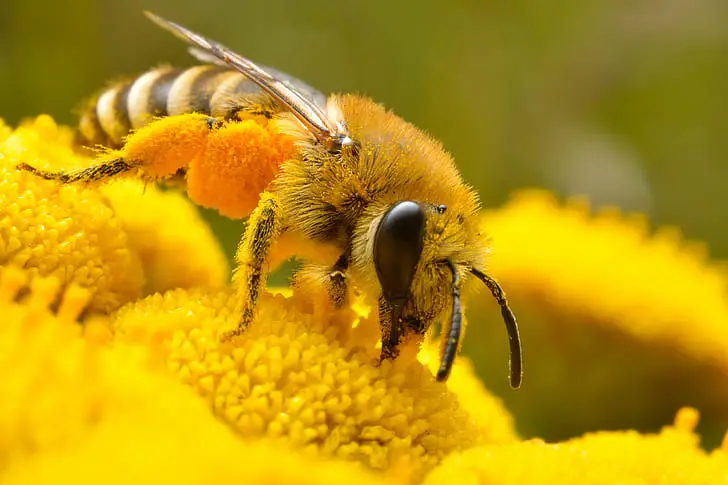
Gardens are vital havens for wildlife, especially in urban areas where natural habitats are limited. They provide essential resources like shelter, food, and breeding grounds for a variety of species.
Providing Shelter and Safety
Gardens offer refuge for wildlife, ranging from birds to beneficial insects and small mammals. Dense shrubs, trees, and layered plantings give creatures places to hide and nest, safe from predators and harsh weather.
Food Sources for Urban Wildlife
- Flowering plants attract pollinators such as bees and butterflies by providing nectar.
- Fruit-bearing plants supply food for birds and small animals.
- Native plants cater to the specific dietary needs of local wildlife, supporting their survival and reproduction.
Creating a garden that includes a mix of trees, shrubs, flowers, and grasses not only enhances the aesthetic appeal but also plays a crucial role in supporting urban biodiversity. By doing so, gardens act as critical ecosystems that sustain various forms of life.
11. Provides Food Security
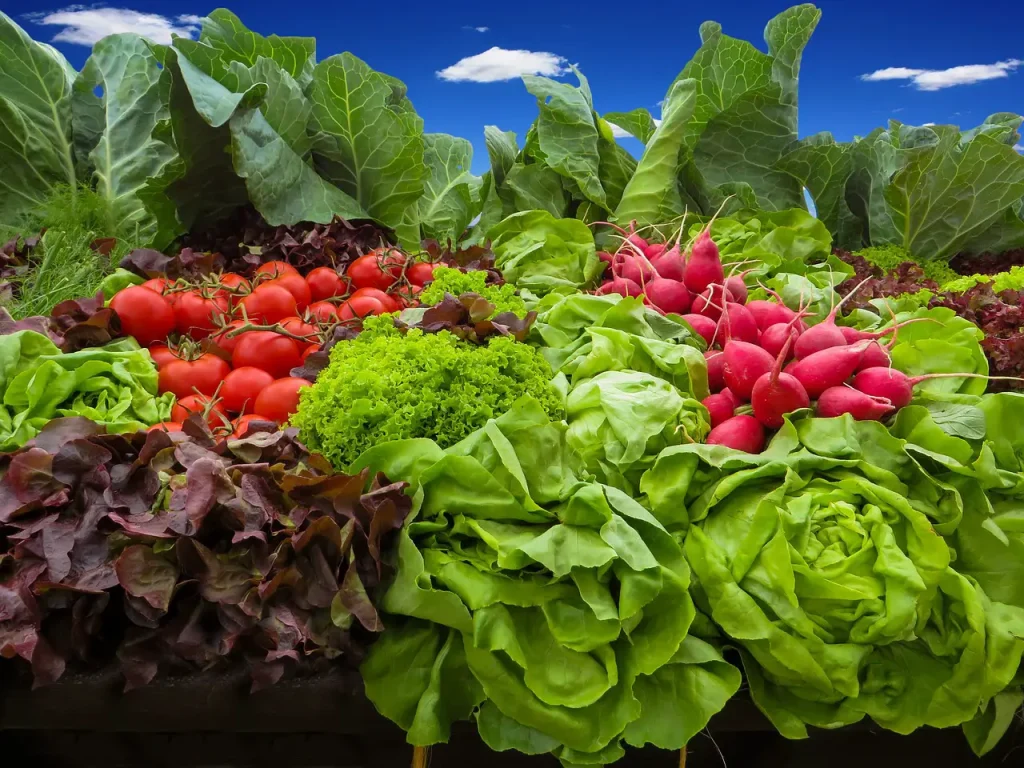
Home gardening is a powerful tool for enhancing food security by providing reliable access to fresh, nutritious produce right from your own backyard or balcony.
Direct Access to Fresh Produce
Growing your own food means you have fresh fruits, vegetables, and herbs available just steps from your kitchen. This accessibility can significantly reduce the reliance on grocery stores and help ensure that families have a continual supply of fresh food.
Reducing Food Deserts
In urban areas where access to fresh produce can be limited, home gardens can transform spaces into vibrant sources of food. This is particularly important in communities known as food deserts, where access to affordable and healthy food options is scarce.
Enhancing Nutritional Value
Food from your garden is typically richer in nutrients than store-bought produce that may have been harvested early and transported long distances. Home-grown food can be harvested at peak ripeness, providing maximum flavor and nutritional benefit.
By fostering food production at home, gardening not only contributes to personal health and well-being but also builds resilience against food supply disruptions, making it a key strategy in combating global food insecurity.
12. Reduces Stress
Gardening is not only beneficial for the environment but also offers significant mental health benefits, including stress reduction and mood enhancement.
Scientific Findings on Stress Reduction
Studies have shown that gardening can lower cortisol levels, the body’s primary stress hormone, leading to feelings of relaxation and reduced stress. Engaging with plants and soil, even for short periods, can act as a natural stress reliever.
Mood Improvement
The act of nurturing plants and witnessing their growth can lead to an improved mood. The sensory experience of gardening, from the feel of the soil to the smells of flowers and herbs, contributes to emotional well-being.
Therapeutic Effects of Gardening
Gardening is often used as a form of therapy in various settings, including hospitals and community centers. This therapeutic gardening helps individuals cope with various mental health issues by providing a calm and nurturing environment.
These studies underscore the potential of gardening as a powerful tool for improving mental health, offering a peaceful escape and a rewarding experience that enhances overall well-being.
13. Reduces Noise Pollution

Gardens can serve as natural sound barriers, significantly reducing noise pollution in busy areas. This effect is achieved through the strategic placement of plants and trees.
Natural Sound Barriers
Plants and trees absorb, deflect, and refract sound waves, making gardens effective at reducing noise pollution. Tall trees with dense foliage are particularly good at blocking sound from highways and industrial areas.
Strategic Planting for Noise Reduction
Arranging plants in multiple layers using trees, shrubs, and ground cover can create a thicker barrier that enhances noise reduction. The use of evergreens, which retain their leaves year-round, is especially beneficial for continuous noise control.
Enhancing Quiet Urban Spaces
In urban environments, creating green spaces with plants and trees can transform noisy areas into peaceful retreats. This not only improves the quality of life for residents but also contributes to a more serene urban atmosphere.
By incorporating these natural elements, gardens can effectively mitigate noise pollution, providing a quieter, more enjoyable environment.
FAQ: The Environmental Benefits of Gardening
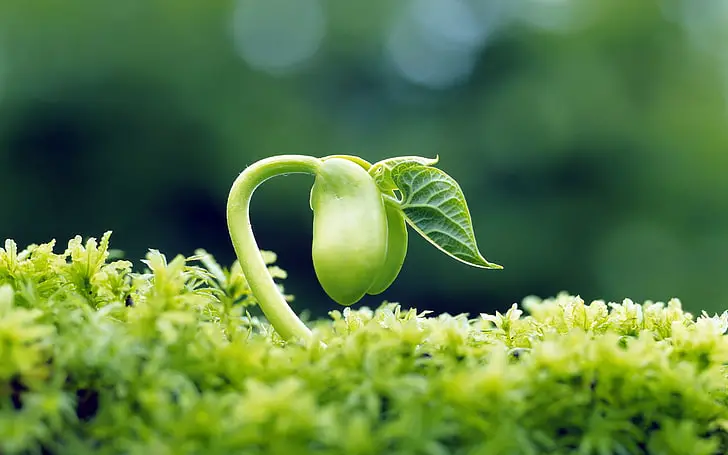
Curious about how gardening makes a difference to our planet? This FAQ section dives into some of the most common questions about the environmental benefits of gardening.
Learn how this green activity not only beautifies spaces but also plays a crucial role in sustaining our environment.
Q. Why is gardening good for the environment?
A. Gardening is beneficial for the environment because it helps reduce carbon emissions, conserves water, and improves air quality by absorbing pollutants. Additionally, gardens support biodiversity by providing habitats for various species.
Q. How do growing plants help the environment?
A. Growing plants absorb carbon dioxide during photosynthesis, which helps reduce greenhouse gases in the atmosphere. They also release oxygen, improve soil health by preventing erosion, and can clean contaminants from the soil through phytoremediation.
Q. How can gardening be beneficial?
A. Beyond environmental benefits, gardening can improve mental health, reduce stress, enhance physical activity, and provide fresh, nutritious produce. It also fosters community engagement and can be a tool for education and social interaction.
Q. How do community gardens help the environment?
A. Community gardens increase green space, which is crucial in urban areas for reducing heat buildup, managing stormwater, and purifying the air. They also promote sustainable land use and encourage environmentally friendly practices among community members.
Q. What are the positive effects of community gardens?
A. Community gardens enhance neighborhood beauty and cohesion, provide access to fresh foods, and serve as educational spaces for sustainable gardening. They also improve local ecosystems and help reduce urban heat island effects.
Q. How do community gardens help air pollution?
A. Community gardens help reduce air pollution by increasing the number of plants that filter and absorb pollutants from the air. This contributes to cleaner, healthier air in urban environments where air quality can often be poor.
Conclusion: The Environmental Benefits of Gardening
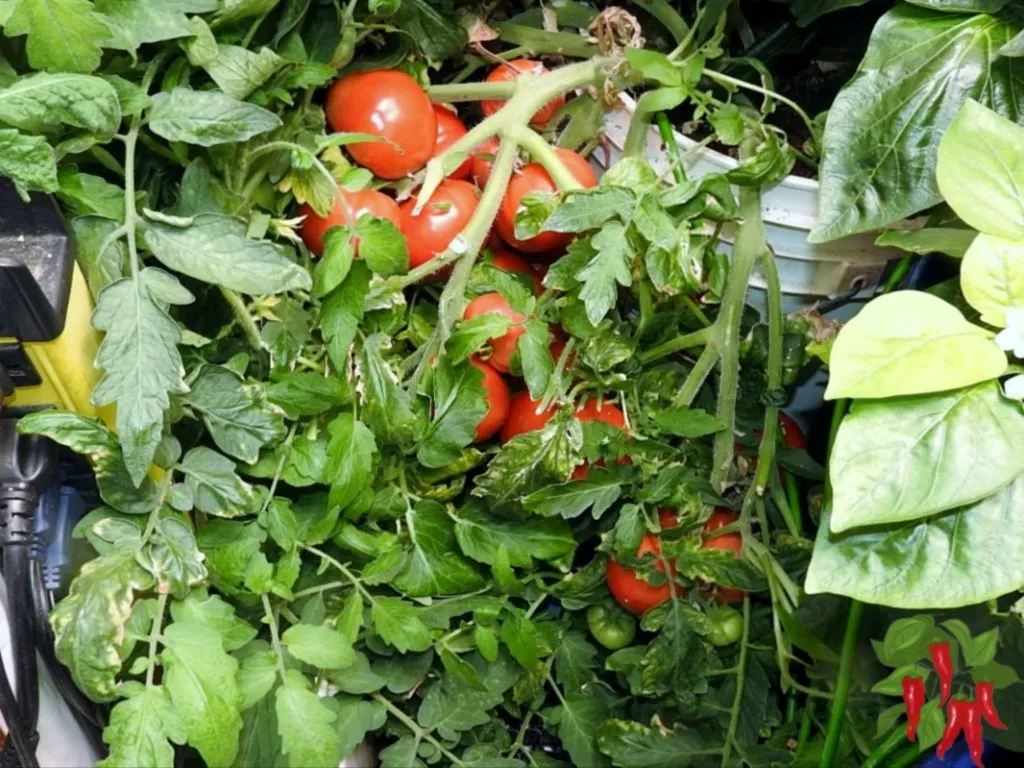
Throughout this post, we’ve explored various ways in which gardening significantly contributes to environmental health.
From reducing carbon footprints and conserving water to supporting biodiversity and enhancing air quality, the impact of gardening extends far beyond the confines of our own backyards.
Gardening is not just about beautifying spaces; it’s a proactive step toward a healthier planet.
Each plant added to a garden plays a part in creating a more sustainable and environmentally friendly world.
We encourage everyone to consider starting or participating in gardening activities. Whether it’s a small container garden on a balcony or a large community garden, every effort counts.
Key Takeaways
- Reduces Carbon Footprints: Gardening cuts down on greenhouse gas emissions by reducing the need for transported goods.
- Conserves Water: Techniques like drip irrigation and rainwater harvesting make gardening an ally in water conservation.
- Supports Biodiversity: Gardens provide crucial habitats for various species, enhancing local biodiversity.
- Improves Air Quality: Plants in gardens help purify the air by absorbing pollutants and producing oxygen.
- Reduces Noise Pollution: Strategically placed gardens can act as natural sound barriers, lowering noise pollution in urban areas.
- Enhances Mental Well-being: Gardening has been shown to reduce stress and improve mood, offering significant mental health benefits.
As we continue to face environmental challenges, the role of gardening as a part of the solution becomes ever more apparent. So, grab a trowel, plant some seeds, and be part of the change towards a greener, more sustainable future.
Read more: 6 Benefits of Gardening: Gardening’s Big Payoffs
Call to Action: Get Involved in Gardening
Ready to make a positive impact on the environment and your well-being? Here are some great ways to get started with gardening, no matter your experience level or living situation:
- Join a Community Garden: Connect with a local community garden where you can grow your own produce and meet fellow gardening enthusiasts. This is a fantastic way to learn from others and contribute to a collective greening effort in your area.
- Start a Home Herb Garden: If space is limited, begin with a small herb garden. Herbs like basil, mint, and cilantro are easy to grow on windowsills or small balconies, providing fresh flavors for your meals.
- Participate in Gardening Workshops: Look for workshops offered by local botanical gardens, nurseries, or community centers. These workshops can provide you with valuable gardening skills, from basic planting techniques to advanced landscape design.
- Volunteer: Many gardening projects and green spaces thrive on volunteer support. Volunteering can be a rewarding way to gain gardening skills while helping to maintain public gardens and green spaces.
- Educate Yourself and Others: Take the opportunity to read books, watch documentaries, and follow online resources about sustainable gardening practices. Share this knowledge with friends, family, and community members to spread the green thumb enthusiasm.
Each of these actions not only enriches your own life but also contributes to a healthier, more sustainable planet. Whether it’s planting a single flower or maintaining a garden, every bit helps in creating a greener world.
Visit my Amazon Influencer Page for videos and gardening products Grow Your Own Garden


